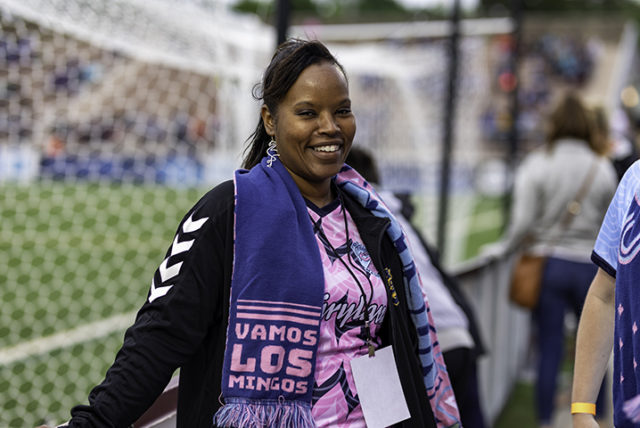 This piece was produced for Badger Vibes, our partnership with Wisconsin Foundation and Alumni Association.
This piece was produced for Badger Vibes, our partnership with Wisconsin Foundation and Alumni Association.
“I’m still kind of trying to figure out what I’m going to do when I grow up,” says April Kigeya.
But “soccer superfan” was not exactly on her list of career aspirations when she graduated from UW–Madison with a degree in legal studies — yet the role is taking up a good amount of her time this summer. She’s become one of the leaders of the Flock, the supporters’ group for Forward Madison FC, the city’s new third-division professional soccer team.
Kigeya arrived in Madison from California in 1991 as a 12-year-old, when her mom came to graduate school at the UW. The family lived on the northwest side of campus in the Eagle Heights apartments, where many student families live — especially those of graduate students. While living there and attending Van Hise Middle School (now Velma Hamilton Middle School), Kigeya befriended a fellow new kid, Dan, who also had been transplanted by a grad-student parent. His family came to Madison from Michigan.
The two started dating while in 10th grade at Madison West High School and married soon after graduation. Dan Kigeya went straight to UW–Madison, and April started at Madison Area Technical College before transferring to the UW a year later. Dan went on to earn master’s degrees in both social work and educational leadership and policy analysis.
The couple welcomed their first son, Demitrius, shortly after starting at the UW, and they ended up living in Eagle Heights, the apartment complex where they’d become friends as children. Their daughter, Kenya, arrived a couple of years later, and it was around this time that April found herself in need of some practical assistance.
“There weren’t a whole lot of support networks” for student parents, she says, so she made it her job to support students like her. “I did programming for student parents and faculty and staff parents. I helped create, or I helped with the implication of, lactation rooms on campus, because that was new back then. When I graduated … I helped write a grant to have my position … be full time. So then I became a parent resource specialist full time for a couple years.”
She stayed connected to the university long after graduating, taking roles at the Multicultural Student Center and within the Precollege Enrichment Opportunity Program for Learning Excellence (PEOPLE) before moving into the private sector, where she worked in security for Target. The move surprised her.
“I didn’t see myself going to Target because it was retail — I didn’t think about retail,” she says. But the environment was fast-paced and varied, which she liked, especially when she was promoted and oversaw asset-loss prevention in 20 stores. Unfortunately, that position was abruptly eliminated in 2017, leaving April — now a mother of four — ready for the next adventure.
“Luckily, I got a nice severance package,” she says. “I traveled so much with the position that it was nice to just be home.”
She accepted a job in Meriter Hospital’s emergency room as a health unit coordinator, in part because it felt a bit like her former job. “I like the fast-paced environment that Target had,” she says. “Something different every day, and you never know what you’re going to walk into, which I like. I thrive off of that.”
But that job wasn’t going to last, either, as Lisa Peyton-Caire, founder of Foundation for Black Women’s Wellness, approached April last year, asking her to consider joining the fledgling nonprofit as special projects manager. Peyton-Caire herself had just left her job at Summit Credit Union to run the foundation full time. The foundation helps connect black women with health resources and lower health disparities through events such as Black Women’s Wellness Day, Sister Circles, and exercise walks.
“Everything has been in [Peyton-Caire’s] head, everything’s been on her computer,” April says. “So it’s been a matter of downloading, and a lot of it has been how to help her let go of some of this stuff, because it’s a lot that she does. I think people just see us posting the walks, and Black Women’s Wellness Day — which is one event in September — but there’s so much stuff that we deal with on a day-to-day basis.”
April also has recently taken on another job as community outreach specialist at the UW’s School of Medicine and Public Health.
Throughout all the job transitions, the idea of leaving Madison hasn’t really come up, even though April has seen many alumni of color seek greener pastures.
“A lot of people of color in particular will come here and get their degree, because it’s a great school, and then leave because of the culture, or the climate, or whatever,” she says. “Every city has its negatives … [Madison is] a pretty decent place to raise kids. We have the capitol; we have so many outdoor activities; it’s not too far for Chicago; we can do cultural stuff. The schools are good. Of course, there’s issues, but there’s issues everywhere. … And we’re at a point now that we, because we both, Dan and I, were pulled out of middle school to move here, we don’t want to do that to our kids.”
And that’s not to mention Dan Kigeya’s important job — he has worked his way up the school system and just finished his second year as principal at Sennett Middle School in Madison.
Now working in a 15-hour-a-week job at the foundation, April has found the time to foster another passion — soccer superfandom.
She’s been a soccer mom since Demitrius, now 19, was five years old, and she became even more involved in the sport when he was a freshman at James Madison Memorial High School and chose soccer over football. He’s now playing for the Green Bay Voyageurs in USL League Two and preparing for his sophomore season at Gonzaga University.
It was late January or early February of this year — about the same time that Demitrius was approached to play for Green Bay for the summer — that April learned about Forward Madison FC, the new professional soccer team that would begin play in USL League One in the month of April. She also learned about the Flock — the unofficial supporters’ group for the club, so called because Forward Madison’s mascot is the flamingo (specifically, the pink plastic kind).
“My main goal is to try to figure out how I can be active in the community, how I can do something where I feel like I’m giving back,” she says. “People have asked me, ‘What job do you want to do?’ There’s no title, I don’t want to do a certain thing. I just want to have an impact in a positive way. I liked soccer because my son plays soccer, so naturally I was like ‘Oh, I’ll see what they need help with.’ So I went on the Flock’s website, and they were looking for people to help, so I filled out the little form and then they emailed me, I met with them. And I’ve been a part of the leadership team ever since. And then [I] helped start Mingo Ladies and Featherstone Flamingos.”
Mingo Ladies, as the name implies, is a group specifically for fans who identify as women, while Featherstone Flamingos is an all-inclusive supporters’ group that aims specifically to bring black culture to the games — not to mention more black fans.
“We want the stands to be more reflective of what the team looks like, because these players aren’t from here for the most part,” she says. Indeed, only one player on Forward Madison’s roster is a Madison native — former Badger men’s soccer player Carl Schneider ’15 — and one other played a season for Madison College after moving up from Atlanta. The rest of the players hail from Japan, Panama, Brazil, Mexico, Jamaica, and all over the United States.
Forming specialty supporters’ groups, like La Barra 608 for the Latino community or Left Leg for political lefties, has been part of the supporters’ strategy to make sure the stands are as diverse as the team.
“Especially for Madison, the Latino population is huge, so La Barra is very influential. And I think for me, the reason why I wanted to help with the Featherstone Flamingos and Mingo Ladies is because we’re trying to bring it to everybody in Madison,” she says. “It’s typically a football town. Everybody will go to Badger [games], they know what the Badgers play. There’s a separate culture with that. But soccer not so much. Unless you are a parent of a kid that plays soccer, you’re not involved as much.
“We just want to make people feel like they’re welcome and able to enjoy the sport and let them know there are people that look like you that play this sport,” April adds. “And hopefully that will trickle down to the kids.”
That’s not to say she and Featherstone Flamingos cofounders Chris Fox and Kyle Carr will just sit and wait for that trickle-down to happen.
“We’ve planned a lot of outreach. Our goal is to get into the schools and get the kids involved at a young age,” she says. “Typically [for] African American kids, soccer is not a thing that you do. It’s either basketball or football. You know, it’s like I’m going to the NFL or I’m going to the NBA, but they don’t really think about soccer. And [we want] just to bring that awareness to them. And to let them know it’s fun. At these games we have a lot of fun. Whether it’s snowing or raining or whatever, you know, we’re out there.”
Indeed, in the early part of its inaugural season, Forward Madison has led the league in home-game attendance, and many players and coaches have noted that the Flock has managed to keep chanting, singing, and drumming for all 90 minutes of every game.
That’s pretty impressive for a football town.




























